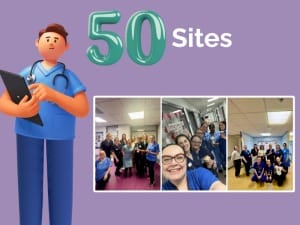Here at System C, we understand that implementing a digital system within maternity or neonatal services is a challenge. We recognise that these environments operate around the clock, and care must continue with minimal interruption. That is why we work closely with perinatal services to ensure the implementation of BadgerNet EPAGU, Maternity and Neonatal EPR is smooth, clinically aligned, and fully supported from the outset.
The costs and effort involved in digital transformation are considerable, which makes it even more important to get it right. A well-implemented system delivers long-term value as it supports clinical teams, leading to better outcomes for patients and families. Read ahead to discover our top tips when procuring and implementing a system for your perinatal service.
A System Fit for Purpose
When looking for a digital system, perinatal services must ensure that the system is designed specifically with the NHS in mind. The chosen solution must also offer a variety of flexible reporting tools as this will allow units to tailor the system to their own needs.
Clinical safety is also of paramount importance; perinatal services must be able to have a centralised and comprehensive view of each pregnancy to ensure the continuity of care.
BadgerNet is a configurable system that adapts to the needs of each perinatal service. We work closely with clinical and project teams to ensure the system fits their existing processes and supports their clinical goals. Our experience in perinatal care and our understanding of NHS priorities allow us to deliver a system that is both clinically relevant and operationally effective.
Establishing Clinical Ownership from the Start
We encourage perinatal services to appoint a clinically-led team that includes a designated digital neonatal midwife or nurse, as well as a doctor, from the very beginning. It is also incredibly important to include the IT department; by working together, a perinatal service can get the best out of the system. Their involvement ensures that the system reflects clinical workflows and is designed with frontline users in mind. When clinicians help shape the system, they are more likely to trust and adopt it. The appointment of a full-time digital midwife or nurse plays a key role in monitoring and supporting the system once it is live.
We provide support by assigning NMC-registered, System C nurses and midwives with hands-on experience using the BadgerNet Neonatal EPR and BadgerNet Maternity platforms to collaborate with the clinical team. This ensures a clinically led, operationally managed, and digitally supported implementation.
Mapping Processes
Process mapping is a vital step in implementation. It helps the teams to identify every workflow and ensures that no part of the care pathway is overlooked. It is very important to work with your supplier during the mapping process to ensure that the perinatal service does not miss anything.
As a result, we work tirelessly with perinatal services and the clinicians who are both experts in the field and with the system, to help map out their processes in detail to ensure that BadgerNet fulfils their clinical and operational needs.
Delivering Training by Engaging Clinicians
Training is essential to successful adoption. We provide face-to-face sessions so that perinatal services can build internal expertise. We believe that local champions who are proficient with the system can help embed the system into everyday practice.
We believe that when frontline staff feel confident using the system, they are more likely to embrace it and help drive cultural change. As a result, we recommend that perinatal services offer a variety of workshops, drop-in sessions, and clinical training events. These events help build awareness and enthusiasm for the new system. We believe that transparency and early engagement are key to building trust and ensuring that staff feel empowered to make the change.
Test Environment
One of our offerings is that we provide a dedicated BadgerNet test environment where perinatal services can explore configuration options for every clinical scenario and validate their future workflows. Our clinical specialists support digital midwives, nurses, and doctors to ensure that the system performs as expected. Clinicians and hospital staff must push the system to the limits through testing, as this will help ensure a safe and confident go-live.
Supporting the Go-Live Period
During the go-live period, we make sure that our clinical transformation experts are on-site. They help to walk the floor, in order to support staff directly. This hands-on approach helps build confidence and ensures that the transition to the new system is as smooth as possible, without any downtime.
Once the system is live, our support continues. Perinatal services are granted direct access to their clinical transformation specialist as well as our service desk. We also host quarterly user groups where other perinatal services can share experiences, influence the system roadmap, and connect with other users. The BadgerNet community is a valuable space for collaboration and continuous improvement.
Realising the Benefits of a Well-Implemented System
When implemented well, BadgerNet can consistently deliver both cash-releasing and non-cash-releasing benefits. Perinatal services gain a system that supports their staff, improves patient care, and delivers long-term value. With the right people in place and the right support from our teams, digital transformation becomes an opportunity to enhance care and strengthen services.
Next steps
To discover how BadgerNet can support your perinatal service, download our brochure.
Explore our full collection of news and blogs to keep up to date with everything happening at System C. From product updates and industry insights to company news and expert opinions.
If you have any questions or enquiries, don’t hesitate to get in touch. Our friendly team of experts is always ready to assist you









